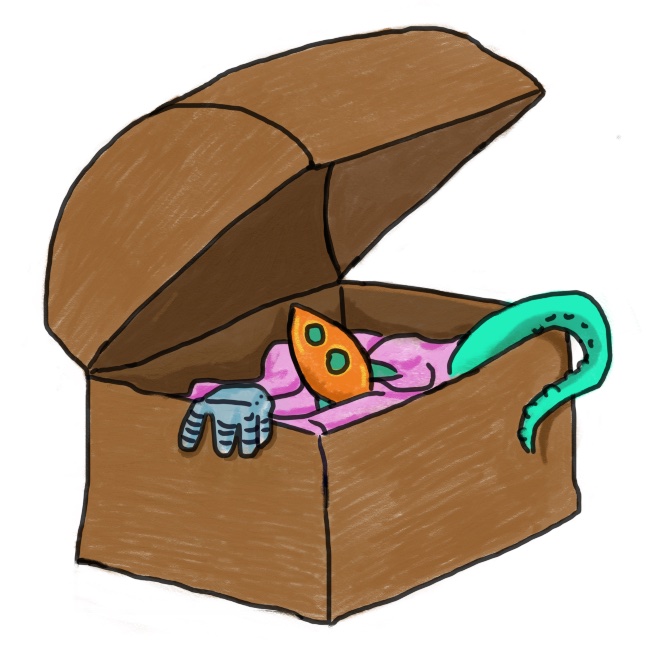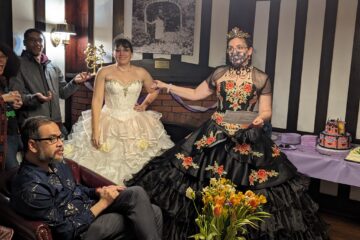There was an essay contest on the theme of “What is home?” and though I didn’t win, I did end up on the short list. So, here’s what I wrote. A little slice of autobiographic essay.
Home is Dinner Every Night
Home is a place that repulses.
I’m walking down the narrow gravel shoulder of Route 84 behind my mom, who is hoping to hitchhike all the way to Cleveland. Cars fly past. Grace and I are ten or so, obedient as kids are at that age. Grace is silent and dejected, but I am hopeful for the city, holding my thumb out alongside Mom’s, stepping out to make the cars have to swerve. Mom laughs, “That’s it, kid. Get them!”
No one stops, though, and it gets cold enough to see our breath as it gets dark. We end up at a gas station, all white and blue and dark windows. “Cars will stop here as soon as they open,” Mom says, and leads us around the building. There’s a metal bench next to the locked restroom. “We’ll wait here. We’re never going back.”
As I snuggle deeper into the puff of Mom’s coat, trying to get more of my skirt under me on the metal slat bench, it occurs to me that anyone who sees us would think we’re homeless, but a day’s walk away is our house, our bunk beds with the thin, cowboy-print mattresses Dad had been so proud to find at a garage sale.
Still, I hope this will be the first of many nights on the road. I’m prepared. Through a hole in the pocket of my coat, I have filled the lining with small emergency items: a packet of crackers, a perfume bottle filled with rubbing alcohol for treating injuries, a needle and thread. Grace and I haven’t eaten for about two days, so the hunger has metastasized into a non-feeling. If I open the crackers, it will only flare up. Food will be easier, in the city. Crackers can be gotten from counters where soup is sold, and ketchup packets and chalky white mints.
When I’m sure Mom is asleep, I can slip away and keep going.
The police car pulls up quietly, lights on but no siren. We recognize the man who gets out. The local police are often at our house. “Do you need a ride somewhere?”
“Oh, just home, officer,” Mom says.
I feel betrayed. “Or Cleveland,” I say. Mom and the officer laugh, and he takes the suitcase from me and puts it in his trunk. I don’t put up more of a fight. This is the way our life is. Another time, Mom gets her sister to drive us to Cleveland and we wander the city all day with her heavy suitcase until Grace and I have blisters on every finger. We discover there’s a swimming pool inside the big hotel next to Tower City and we marvel through glass at it. A social worker drives us home that time. My dreams are full of skyscrapers.
What drove Mom to need to get away? The only danger in our house came from Mom, herself, her sudden angers, her screams in the night, leaning over the bed hissing, “You ruined my life. I hate you. I hate you.”
The first time we ran away from home, Grace and I were four. We didn’t think we were running away; we were searching. Our older sister had taken us to an abandoned dance hall, magical with its play-kitchen of empty counters and moss-covered roof. Someone had left paper doilies in there and we had stolen them to use for undefined crafts.
Grace and I thought we could find the dance hall again if we went straight through the back yard and the woods. But the woods ended on an empty field. That was where they picked us up, literally, snatched by the armpits into the air by horrified aunts. We hadn’t felt we’d been gone that long.
The last time I ran away from home, I was eleven and spent the night in a neighbor’s treehouse. I wasn’t friends with the neighbor; he was too young. I simply coveted his treehouse. It was a disappointingly plain box on the inside. I liked the smell and the view, but had a hard time sleeping, fearing discovery, and finding my hips and shoulders got sore on the hard wood, all the corners of me. I returned home in the wee hours and found no one but Grace had missed me.
It wasn’t that I gave up or stopped feeling the urge to wander. Dad got custody after that, and though he’d kick us or belt us for not doing the dishes or making a mess, running away didn’t feel necessary anymore; we had dinner every night.
Still, I get itchy feet. I never felt comfortable spending two nights in a row in my first apartment. When I was too poor to go anywhere, I rode my bike around the neighborhood, unsure what I was looking for other than something I hadn’t seen yet.
Our older sister ran away so often she was permanently staying with friends by sixteen. She never went anywhere without a grocery bag knotted around a spare change of clothes. She bragged that she was a wanderer.
I spent four years trying to track her down so I could see my niece and nephew. Several rather bitter former roommates slammed doors in my face, “That bitch never paid a dime of rent or got a job,” the usual refrain. I can’t blame them; my sister lived with me for a while, too.
I had a phone number, but hundreds of calls were never returned. Her voicemail recording was a man saying, “This number has been disconnected.”
One day, out of the blue, she texts me from that old number. Could I meet her tonight, at this address? Google maps shows me a motel, far out in the countryside.
When I get there, I almost pass it. The motel is weathered, its sign unlit. The moldy grey 1950s cinderblock crouches against the forest. She hadn’t told me the room number, but I see a massive Econoline van packed to the gills with stuff and assume it’s hers.
There’s a clunk and some fussing to get a propped bar off the door, my sister shuffling back to make room to open up. The room smells of my sister’s heavy perfume and is crammed like a storage locker. A tiny cube of a television plays a cartoon for my niece, who is on the floor, half-turned to watch me enter, all bones and eyes in pink pajamas. I see myself and my twin in her, pulled in the wake of a chaotic mother, silent, uncomplaining, ignored.
My older sister clears a place on the bed for me to sit. She doesn’t answer my question about her son. She just needs money, she says, for the van. The room is paid up until the end of the week. “The guy here gave me a deal because I cleaned the bathrooms for him. Marie, you would not believe the state they were in!”
The last time I’d given my sister money, it had been my entire savings, and she’d shown up a week later to ask for more, having, in fact, forgotten I’d given her anything. My own mother, whenever relatives would give us money, would burn it away frivolously. One time Aunt Joyce gave Grace and I each five dollars for our birthday and Mom made us sit and watch her spend it to eat lunch at a diner. That’s where I got my soup crackers, which I held on to until they were stale before eating. No, I won’t give money, but I’ll give whatever will actually solve the problem.
“Come live with me,” I say.
My sister blinks, “but the room is paid until Friday.”
My niece is pretending not to watch us, but I read her anxiety in every line of her twisted shape, legs tucked to the side. One time, Mom took us all the way to Oregon. I attempted escape in Ohio, in Iowa, and succeeded in Eugene. I was a year older than my niece then. Would I ever see her again?
“Come live with me,” I am firm.
“I don’t know. If I just had four hundred, I could get the brakes fixed. This guy next door will do it for me.”
I lie and say I don’t have the money. She then asks if I can take her to a job interview. It’s ten pm on a Wednesday. I’m doubtful, but I say okay.
As we wait in the parking lot of a Brown Derby, my niece tells me she gets locked in most days, that she spent Halloween, which just passed, alone. “But I put on my costume from last year, even though I was just sitting in the room watching cartoons.”
My heart breaks. I want nothing more than to take her trick-or-treating.
Before my sister returns, I have already texted my husband that they are coming to live with us. She drops into the passenger seat holding papers. “I asked to see a manager right away as I filled out the application. You have to do that.”
Of course, the “interview” was more plan than truth. She lives her life like our mother, like a scheme, twenty browser tabs ready to jump to, or close without remorse.
I think about how I never felt that home was where my mother was… home was not people, it was stability. Safety. A place you don’t feel like a thief if you take something to eat.
“You’re moving in with me,” I say. “I already cleared it with Brian.”
She still insists on holding out for a better plan, but the next day the overstuffed Econoline is in my driveway and my niece is still quiet and shrinking, but her anxiety is replaced with hope. She hangs on my arm, and I never want to let go.
I don’t. I stop having itchy feet. I need to be home. I need to see dinner is made every night. I need to make home a place that attracts. I need to step between my sister’s fists and my niece.
Five years and a custody battle later, she calls me “Mom.”
Home is a place you can give.


